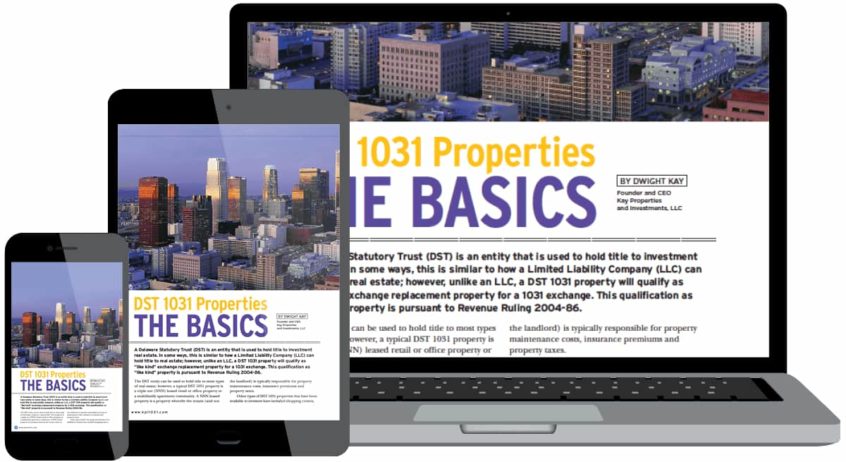By: Dwight Kay, Founder – Kay Properties and Investments, LLC
What Does DST Stand For?
DST stands for Delaware Statutory Trust and is an entity that is used to hold title to investment real estate.
What is 1031 Exchange?
A 1031 tax-deferred exchange is a way to temporarily avoid capital gains taxes on the sale of an investment property or commercial property. Capital gains taxes can be hefty, running as high as 15-30% when you combine state and federal together.
The 1031 Exchange gets its name from the IRS code Section 1031. It allows an investor to replace one investment property with a like-kind property and then put off the capital gains on the sale. (A like-kind property is a piece of real estate that is similar to another in nature.)
Why Use a 1031 Exchange?
1031 exchanges are very valued by retiring people who hold appreciated real estate and who may be looking for ways to turn that real estate into a passive income source. The key word here is “passive”. Using a 1031 exchange, the real estate owner can exchange a property that may be high maintenance (both literally and figuratively) with a property that is more stable and easier to take care of. In essence, 1031 exchanges turn problematic investment properties (with troublesome tenants, expensive repairs, and turnover management) with a property that has none of those things. The new property is a source of regular, passive income to the owner, so that the owner–who is now typically in retirement–can enjoy time off without have to worry about the day-to-day cares of property management.
How Does a Delaware Statutory Trust Work?
The real estate sponsor firm gets the property under the Delaware Statutory Trust and seeks investors to purchase the beneficial interest. Investors can use the 1031 Exchange to put their money directly into the Delaware Statutory Trust, or they can directly purchase an interest in the DST.
The investors in the DST get the benefit of having the investment property managed by someone else (thereby providing passive income). An example would be a retiree who wants to sell a fourplex property that they no longer wish to maintain, and then would invest in a DST that owns a 500 unit property, or a strip mall, or a health clinic that is professionally managed. The retiree no longer has to take care of direct management of the property but gains the income that they were seeking.
What are the Risks of a DST?
Just because a retiree (or other investor) does not want to be involved in the day-to-day management and operation of the DST doesn’t mean that they are getting all reward and no risk. There will always be risk in any investment, and DSTs are no different. Any real estate investment could be the victim of loan defaults, vacancies, or downturns in the real estate market. This is why it is so important to consult a qualified investment professional for advice. This is where Kay Properties comes in. We can walk you through all of the risks, the potential rewards, and make the entire system make sense to you.
Conclusion
A DST stands for Delaware Statutory Trust and is an entity that is used to hold title to investment real estate. In some ways this is similar to how a limited liability company or an LLC can hold title to real estate however, unlike an LLC, a property structured DST property will qualify as like kind exchange property for a 1031 exchange according to the IRS revenue ruling 2004-86.
The typical minimum investment for a DST 1031 Property is $100,000 allowing an investor to diversify* his or her exchange proceeds among multiple properties. DST 1031 properties also have various leverage ratios to potentially satisfy an investors exchange requirements of taking on equal or greater debt.
The typical loan to value of a DST 1031 property is 50% however, some DST properties are offered all cash/no debt in order to eliminate all financing risks. Kay properties and investments is a real estate wealth advisory firm that specializes in DST 1031 properties. Call us today to receive a free list of our current DST 1031 properties.
Call us today at 1-(855) 899-4597 or complete the form on this page to receive a free list of our current DST 1031 properties.
*Diversification does not guarantee profits or protect against losses.

